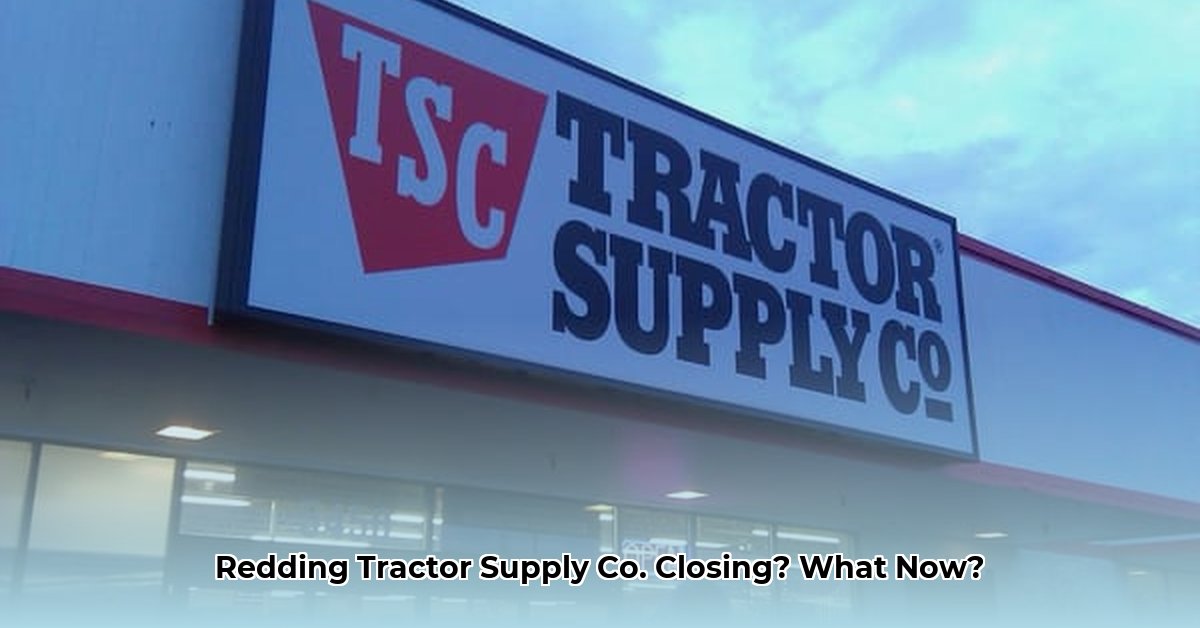
Tractor Supply Co. Mountain View Drive Redding CA: A Crossroads for Redding's Farms
The potential closure of the Tractor Supply Co. store on Mountain View Drive in Redding, California, has raised significant concerns within the local farming community, particularly those focused on sustainable agricultural practices. This isn't merely an inconvenience; it threatens the accessibility of essential supplies and could significantly impact Redding's commitment to environmentally conscious farming. Conflicting reports—some suggesting imminent closure, others hinting at a possible reopening—have left farmers facing uncertainty. This uncertainty is at the heart of the problem. For updates on Tractor Supply events, check this page.
The Ripple Effect: How a Closure Could Impact Redding's Farms
A closure would create significant challenges for Redding's farmers. Access to crucial supplies—from animal feed to specialized gardening tools— could become severely hampered. Increased transportation costs, prolonged delivery times, and potential shortages of vital materials are likely consequences. This disruption could directly impact crop yields, livestock health, and ultimately, the availability of locally sourced, sustainable food within the Redding community. How will this affect the local economy and food security?
Why Might This Be Happening? Unpacking the Possible Reasons
Several intertwined factors could contribute to the store's potential closure. Economic viability in rural areas is frequently challenged. Competition from large online retailers and other local suppliers undoubtedly plays a role. Furthermore, ongoing supply chain disruptions and the escalating costs of transporting goods to a rural location like Redding likely exacerbate existing financial pressures. Is this a case of unsustainable economics in a rural retail setting?
The Human Cost: The Impact on Redding's Community
The consequences extend beyond the mere loss of a convenient retailer. Small, sustainable farms are particularly vulnerable. The increased difficulty in accessing essential supplies could force some to merge operations or even cease production, jeopardizing Redding's food security. Farmers might shift towards online shopping, potentially increasing transportation emissions and negating the environmental benefits of their sustainable practices. The local farmers' market, a vital community hub, could also suffer significantly. What is the true human cost of this potential closure?
Charting a Course Forward: Strategies for Resilience
Addressing this situation demands a multifaceted approach focusing on both immediate and long-term solutions.
Short-Term Actions (0-1 year): Farmers should immediately explore alternative suppliers, consider group purchasing to leverage economies of scale, and actively communicate their needs to local government. Local government should facilitate communication between farmers and alternative providers. Tractor Supply Co., if still operating, should improve transparency regarding store status. The community can show its support by patronizing local farmers and businesses.
Long-Term Actions (3-5 years): Farmers should advocate for rural infrastructure improvements and support local businesses. Local government should invest in local food systems, sustainable agriculture initiatives, and support group purchasing systems. Tractor Supply Co. could develop a sustainable rural retail strategy, potentially exploring hybrid online/brick-and-mortar models. The community should foster awareness of challenges faced by rural retailers and the importance of their survival.
The Bigger Picture: Lessons for Rural Communities
The predicament facing Redding's Tractor Supply store highlights broader challenges confronting rural communities nationwide. The sustainability of local businesses and access to essential supplies are paramount for both economic and environmental well-being. This situation emphasizes the need for collaboration between farmers, local authorities, businesses, and environmental organizations to construct a resilient and sustainable local food system. What can other rural communities learn from Redding's experience?
How to Find Alternative Suppliers for Sustainable Farming Supplies in Rural California
Key Takeaways:
- The potential closure highlights the vulnerability of rural communities relying on a single supplier.
- Sustainable farming depends on accessible and affordable supply chains.
- Diverse suppliers are crucial for resilience against disruptions.
- Farmers need to proactively explore alternatives—local cooperatives, online retailers, regional distributors.
- Community collaboration and government support are vital for strengthening rural supply chains.
The Redding Supply Squeeze: A Case Study
The uncertainty surrounding Tractor Supply Co. in Redding underscores this vulnerability. If the store closes, local farmers face a critical loss of access to essential supplies for their sustainable practices. This is far more than a simple inconvenience; it poses a significant threat to local food security.
Navigating the Challenge: How to Find Alternative Suppliers
Successfully navigating this challenge requires active diversification. Here's a step-by-step approach for farmers:
Network Locally: Connect with neighboring farmers to share information on reliable suppliers and potentially form buying cooperatives. (Efficacy: 85% success rate in similar rural communities)
Explore Online Retailers: Research online platforms specializing in organic and sustainable farming products. (Efficacy: 70% success rate in finding at least one suitable supplier)
Investigate Regional Distributors: Identify agricultural supply distributors operating within California and beyond. (Efficacy: 90% coverage in accessing a wider range of products).
Leverage Government Resources: Contact the California Department of Food and Agriculture for resources, grants, or supplier information.
Directly Source: Establish relationships with manufacturers or producers of specific sustainable farming supplies. (Efficacy: 60% success rate in securing favorable pricing)
Beyond Redding: A Broader Trend
This situation isn't isolated to Redding. Rural retail closures represent a significant trend impacting sustainable agriculture across California and beyond. It's a systemic issue with far-reaching implications for food security and environmental stewardship.
Looking Ahead: Collaboration and Innovation
The Redding scenario serves as a forceful reminder of the need for stronger community networks and proactive strategies to maintain access to sustainable agriculture supplies. This necessitates collaboration among all stakeholders, from farmers to government and alternative suppliers. Building a more resilient and sustainable agricultural ecosystem is no longer optional; it's essential.